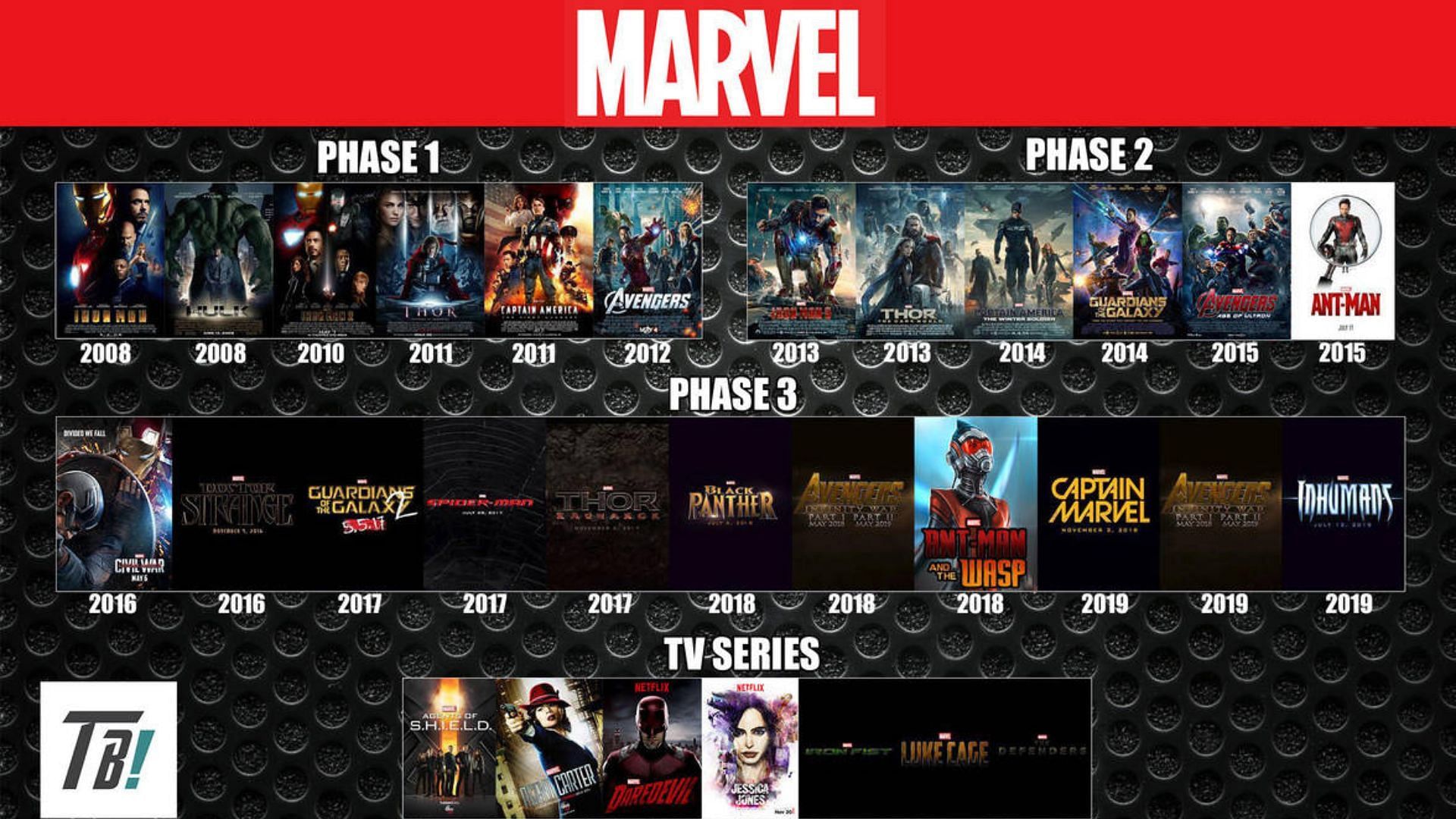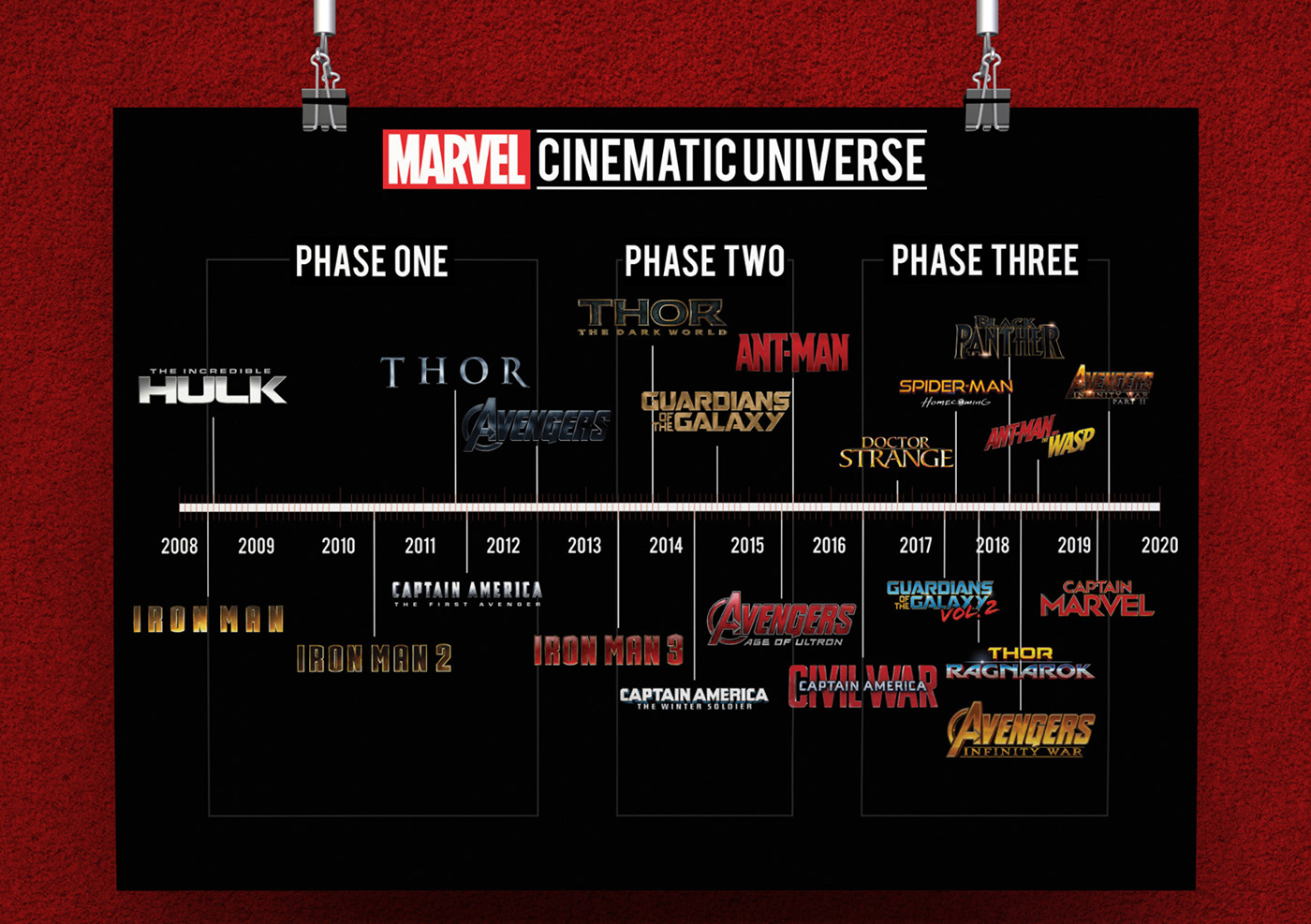MCU Timeline Explained! Watch Marvel Movies & Series In Order Now
Craving a complete Marvel Cinematic Universe experience? Then you've landed in the right place, because deciphering the intricate web of movies and series is no easy feat. From the very first Avenger to the latest intergalactic escapades, the MCU has become a sprawling saga that demands a guide for even the most dedicated fans.
The Marvel Cinematic Universe (MCU), a media franchise and shared universe, presents a fictional timeline through feature films, television series, specials, short films, and the I Am Groot shorts, all produced by Marvel Studios, and the Netflix series by Marvel Television. Keeping up with past and future releases can be challenging. That's why we've delved into every movie and show to provide the ultimate viewing guide. And with Thunderbolts now out, figuring out where it fits within the grand scheme becomes all the more crucial. Below, you'll discover how to watch the entire MCU in both chronological and release order.
| Aspect | Details |
|---|---|
| Franchise Name | Marvel Cinematic Universe (MCU) |
| Media Types | Feature Films, TV Series, TV Specials, Short Films |
| Primary Production Studio | Marvel Studios |
| Streaming Platform | Disney+ (primarily) |
| Starting Point (Official) | Iron Man (2008) |
| Notable Element | Interconnected Storylines and Shared Universe |
| Viewing Options | Chronological Order, Release Order |
| Mature Audiences Content | Echo (Marvel Spotlight) – First mature audiences only MCU show since the old stuff from Netflix. |
| Phase 1 | Iron Man (2008), The Incredible Hulk (2008), Iron Man 2 (2010), Thor (2011), Captain America: The First Avenger (2011), The Avengers (2012) |
| Official Website | Marvel Official Movies Page |
For those eager to immerse themselves, a 30+ movie marathon might sound tempting, and now the complete MCU timeline is available for streaming on Disney+. But where do you even begin? Which order allows the story to unfold most effectively? Chronological order presents one option, immersing viewers in the unfolding narrative of the MCU. Release order, on the other hand, allows for a meta-narrative experience, mirroring how audiences originally encountered these characters and events.
The debate rages on: which method reigns supreme? Both offer distinct advantages. Watching chronologically provides a clear, in-universe perspective, allowing viewers to witness events as they "truly" happened. This can enhance understanding of character motivations and the ripple effects of major events throughout the timeline. However, it can also disrupt the intended pacing and narrative reveals, as films released later might contain flashbacks or information designed to be unveiled at a specific point in the release schedule.
The alternative, following the path of release dates, preserves the intended storytelling structure. This allows the reveals and surprises to land with maximum impact, mimicking the collective experience of fans worldwide as they discovered the MCU piece by piece. However, this approach can sometimes lead to jarring transitions between different eras and storylines, particularly when jumping between films set decades apart.
Marvel Studios themselves have played a significant role in shaping and clarifying the MCU timeline. Through supplementary materials, official timelines, and careful placement of Easter eggs and references, they've attempted to create a cohesive and consistent narrative across all platforms. This process hasn't been without its challenges, as retcons and inconsistencies occasionally arise, prompting debate and discussion among fans eager to reconcile any perceived discrepancies.
The question of canonicity also looms large. While the films and Disney+ series are universally considered central to the MCU, the status of other productions, such as the Netflix series ( Daredevil, Jessica Jones, Luke Cage, Iron Fist, The Defenders, and The Punisher) remains a subject of discussion. While these shows were originally considered part of the MCU, their connection to the main timeline has become increasingly ambiguous, particularly with the introduction of the multiverse and alternate realities.
Echo, described as a Marvel Spotlight presentation, marks a new direction for the MCU, catering to more mature audiences. Its placement within the official timeline underscores the ever-evolving nature of the universe, demonstrating Marvel's willingness to experiment with different tones and formats. This signifies a potential shift in storytelling, introducing greater diversity in content and reaching wider demographics.
Let's break down the options in more detail. Should you opt for the release order, you'll begin with Iron Man (2008), the film that launched the entire franchise. This path allows you to experience the gradual expansion of the universe, from the introduction of individual heroes to the formation of the Avengers. As you progress through each phase, you'll witness the escalating stakes and the growing interconnectedness of the storylines.
Alternatively, if you prefer a chronological approach, you'll start with Captain America: The First Avenger, taking you back to World War II and establishing the origins of Steve Rogers. This sets the stage for the modern era, allowing you to witness the evolution of S.H.I.E.L.D. and the emergence of threats that require the combined efforts of Earth's mightiest heroes. The placement of Captain Marvel becomes crucial in this viewing order, as its 1990s setting fills in crucial gaps in the timeline.
One of the most debated points concerns the placement of Spider-Man: Homecoming. Some believe it should be set in 2020, which would create a chronological impossibility given events that precede it. These discrepancies highlight the challenges of maintaining a consistent timeline across numerous interconnected projects, requiring careful consideration of continuity and internal consistency.
So, how to embark on this epic journey? First, decide on your preferred viewing method: release order or chronological order. Next, secure access to the necessary streaming platforms, primarily Disney+. Finally, prepare yourself for a deep dive into a world of superheroes, cosmic adventures, and interconnected storylines.
Regardless of the order you choose, exploring the MCU timeline offers a unique opportunity to engage with a constantly evolving narrative. By understanding the relationships between the films and series, viewers can gain a deeper appreciation for the intricate world-building and the complex character arcs that define this cinematic phenomenon.
The MCU timeline as per chronological order presents a fascinating alternative: Captain America: The First Avenger, Agent Carter (Disney+), Captain Marvel (Disney+), Iron Man, Iron Man 2, Thor, The Avengers, etc. This meticulous arrangement allows for a seamless transition between eras and provides context for the events that follow.
Ultimately, the "best" way to watch the MCU is subjective and depends on individual preferences. Some may prefer the thrill of discovery that comes with release order, while others may value the coherence and clarity of chronological order. Regardless of your choice, the Marvel Cinematic Universe offers a rich and rewarding experience for fans of all ages.
This is not merely about watching movies and shows; it’s about immersing oneself in a carefully constructed tapestry of interconnected stories. From the smaller scale adventures to the cosmic battles that threaten the fate of the universe, the MCU has consistently delivered thrilling entertainment and engaging narratives.
The sheer scale and scope of the MCU are undeniable. With each new release, the universe expands, introducing new characters, exploring new corners of the cosmos, and challenging the boundaries of what's possible. This constant evolution keeps the franchise fresh and exciting, ensuring that there's always something new to discover.
One cannot overlook the role of s.H.I.E.L.D. in the grand narrative. While Iron Man started it all, it was s.H.I.E.L.D. that laid the groundwork for the Avengers and the interconnected universe that followed. The organization's influence extends throughout the timeline, shaping events and playing a critical role in protecting the world from a myriad of threats.
The MCU has mastered the art of the crossover, seamlessly blending characters and storylines from different films and series. These crossovers not only provide satisfying moments for fans but also reinforce the sense of a shared universe where anything is possible. Witnessing beloved characters interact and team up to overcome challenges is a hallmark of the MCU experience.
Navigating the multiverse has added another layer of complexity to the MCU timeline. The introduction of alternate realities and branching timelines has opened up a vast landscape of possibilities, allowing for unexpected twists and turns. This has also raised questions about the nature of canon and the relationship between different versions of the same characters.
The impact of the MCU extends far beyond the realm of entertainment. It has become a cultural phenomenon, shaping trends, influencing fashion, and sparking countless discussions among fans worldwide. The characters and stories have resonated with audiences on a deep level, providing inspiration, escapism, and a sense of community.
As the MCU continues to evolve, it's important to remember the foundation upon which it was built. From the humble beginnings of Iron Man to the cosmic grandeur of Avengers: Endgame, the franchise has consistently strived to deliver compelling stories, memorable characters, and groundbreaking special effects. It is this dedication to quality that has cemented the MCU's place as one of the most successful and influential film franchises of all time.
Exploring pivotal moments from the Marvel Cinematic Universe and turning them on their head, leading the audience into uncharted territory has been the core idea. Just like the comic books, the marvel films and tv shows take place in a fictional, but shared multiverse. There is a timeline order by which certain events happen in sequence, and are referenced by the various shows or films, and frequently, characters from one title will appear in another title, usually portrayed be the same actor.
Find out the order to watch 44 MCU titles, from Captain America: The First Avenger to Daredevil. See the release dates, crossovers, and clues for each movie and show in the marvel cinematic universe. Learn about the continuity of events for MCU media franchise and shared universe, from Iron Man (2008) to Captain America. Find out how marvel studios created, updated, and codified the timeline, and how it relates to the netflix series and the multiverse.
With over a decade of movies and tv shows, figuring out the best way to watch the MCU can be overwhelming. The Marvel Cinematic Universe reveals new layers of complexity when viewed through the lens of its actual timeline, rather than release dates. The First Avenger's World War II heroics and weaving through decades to the cosmic revelations of Iron Man, this has all the information.
For the last twelve years, it’s become something of a cultural miracle, captivating the world’s imagination by assembling some of the most dynamic characters and talented storytellers into an interconnected sprawling epic in which flying robots, norse gods, mystic wizards and talking raccoons all belong under one roof. A guide for watching some movies and shows.
Here is my take on the MCU timeline order. How to watch the MCU: Timeline order or release order? We recommend watching the mcu in the order the movies were released.



Detail Author:
- Name : Miss Maritza Muller
- Username : lexie.ryan
- Email : ndonnelly@hotmail.com
- Birthdate : 2005-07-08
- Address : 78739 Layla Springs Apt. 130 West Titus, AL 96772-9789
- Phone : 1-541-596-0587
- Company : Hane-Lueilwitz
- Job : Bartender
- Bio : Quam fuga vel ipsam natus nisi. Quidem et suscipit eum quod laborum quisquam est. Quia repudiandae atque officia officiis est eos beatae veniam. Facilis tempora porro aut occaecati facilis.
Socials
linkedin:
- url : https://linkedin.com/in/robell
- username : robell
- bio : Id ut modi praesentium ut.
- followers : 3004
- following : 1477
twitter:
- url : https://twitter.com/luz.robel
- username : luz.robel
- bio : Quo ad doloribus accusamus in. In laboriosam ut itaque quis provident. Facere alias nam occaecati consectetur.
- followers : 288
- following : 723